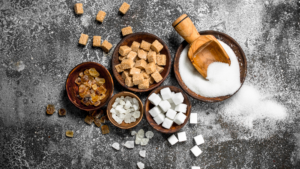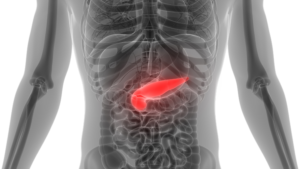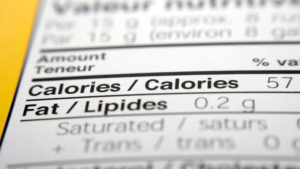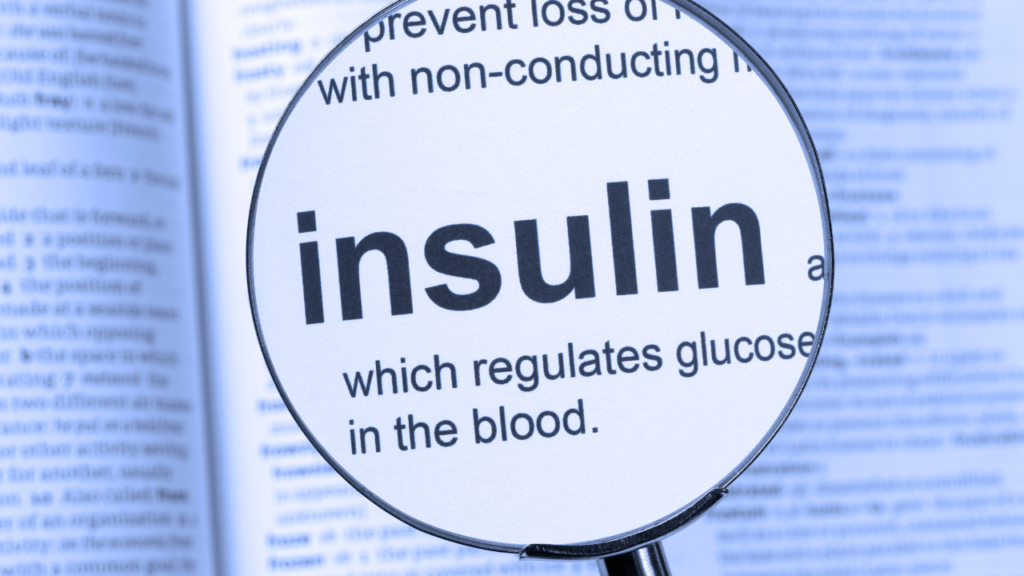When I consider my biggest pet peeves practicing in obesity and weight-management medicine, I would say that one of the more prominent ones is the unnecessary controversy around insulin.
The diet warriors have done a great job regarding insulin and really any and all kinds of sugar as the spawn of the devil, something only the ‘woke’ understand and the reason for all the horrible things that happen in the world. Got a flat tire on the way to work today? Ya, it was insulin’s fault. COVID? 2020? You bet your ass it was insulin and sugar’s fault. Anywho, kidding only kind of aside, the main thing the diet warriors attribute to being insulin and sugar’s fault is the obesity epidemic.
Before we dive into that backward logic, let’s do a little background check on what insulin is.
What Is Insulin?
 Insulin is a hormone that is released into the bloodstream in response to eating food. It is produced from a group of cells called beta islet cells within the pancreas. The pancreas looks kind of like a slug, always depicted as yellow in colour. It takes the shape of an upside-down Nike logo in all of my anatomy textbooks. (Here’s to hoping that Nike considers sponsoring my blog posts.)
Insulin is a hormone that is released into the bloodstream in response to eating food. It is produced from a group of cells called beta islet cells within the pancreas. The pancreas looks kind of like a slug, always depicted as yellow in colour. It takes the shape of an upside-down Nike logo in all of my anatomy textbooks. (Here’s to hoping that Nike considers sponsoring my blog posts.)
So, the pancreas generally hides behind our stomach and liver. It has a head (the bigger end) that attaches to our small intestine and a tail that bumps up against one of our more useless organs called the spleen. Now the pancreas doesn’t just create insulin – it also produces a plethora of other hormones and digestive enzymes that help us digest our food and regulate our blood sugars. So it is pretty useful and vital!
Insulin is what we call an anabolic hormone – it helps our body build tissues such as fat, muscle, etc.
Think anabolic steroids and bodybuilders – anabolic steroids helped them build that cartoon-like amount of muscle. Occasionally they have bouts of rage but, in general, are wonderful human beings as long as they are fed, watered, and can workout.
As Insulin levels increase, they work to bring down our blood sugar levels primarily. In reality, it does so much more! It has the ability to shuttle pretty much all nutrients into our cells. These nutrients come from the food we eat. Our body breaks them down into simpler forms to be taken into the bloodstream (protein = amino acids, fats = fatty acids, carbohydrates = glucose). Insulin acts like a key that opens a door and allows the cells to take up these nutrients so the cells can do the cell things like keep us alive and breathing. Basically, our cells are babies, and insulin is their mother spoon-feeding them pulverized fruit mush that she calls food. After insulin has done its job, and all the cells are happy and burped, insulin levels drop back to ‘baseline’ until you eat again, and the cycle continues. Amazing, right?!
So, Why So Much Hate For Insulin?
We have established insulin is amazing. Necessary! And, I would wager on a microscopic level it is probably pretty cute too. What is there not to like?
The above-mentioned diet factions say that insulin is the fat-storage hormone, which technically has some truth to it. Insulin opens the door for fat cells to take up fatty acids & glucose and store them as body fat. Also, when insulin levels are elevated, insulin will stop the body from burning our fat stores.

Therefore, their general premise is, if we can reduce insulin production, we can get shredded. And, since carbs or sugar increase insulin levels, we need to eliminate them in order to bring insulin levels down. Thus they say that keto, carnivore, and intermittent fasting diets are the solutions to all your problems and monumental weight-loss!
Now you are probably saying, “Umm, this is all so simple and makes perfect sense, maybe you (Dr. Dan) are actually the internet crackerjack?: The latter, I won’t argue, but stay with me here.
Does insulin make you fat?
The short answer: No.
The long answer: It isn’t insulin that makes you fat, it is excess calorie intake.
The longer answer: As I highlighted above, insulin does cause the storage of fat; HOWEVER, that storage system is only going to occur when there is an excess amount of glucose and fat kicking around. You see, fat storage serves a crucial evolutionary role. Our bodies always want to have some fat storage available because back in the day, when we had to actually hunt and gather for our food, there would be periods we might go without (particularly if we were terrible at hunting or picking berries.) And thus, our bodies want to have some stores in place to allow us to survive.

Now our bodies have a priority system in place when we do eat. So if we have gone X hours since eating, our body will prioritize providing nutrients to the cells and organ systems that need the nutrients right now, not to the cells that might, maybe, perhaps need the nutrients later!
The brain is a beautiful example of an organ that thinks it is particularly special. It will suck up a large majority of the nutrients, leaving the rest of our organs to fight over the scraps. As if being at the top of the human body wasn’t already enough.
Anyway, after the dust settles and all the important organs have gotten their share, insulin will then turn to our fat cells and provide them with whatever is leftover.
Nothing left over = no fat gain. If you have eaten less than you have burned = fat-loss. Excess remaining = fat gain.
So, do I need to watch what I eat constantly?

As I always say, one meal, one day is not going to make a difference either way in your weight journey. It comes down to consistency. If you are consistently eating an excess amount of calories, then you will gain weight. If you are consistently eating less calories than you burn, you will lose weight. This is physics and the process of energy balance. See? We are practically doing the work of Einstein or Newton here, and I already feel smarter.
One important point that internet diet zealots forget to mention is that protein also causes an increase in insulin levels – often comparable or higher than sugar. So if you cut out all carbohydrates and only eat fat and protein (as in the keto, carnivore and etc. diets) you are still going to have insulin floating around. How the h*ll does that work then for weight-loss?
Clearly, there is something else at play, and that is a calorie deficit. In each case, the number of calories those individuals are burning is greater than the calories they are taking in.
Final Thought
 Insulin is NOT the reason we gain fat. Eating an excessive amount of calories is. Now, it is not always easy to know where the extra calories are coming from if you aren’t losing weight or your weight is remaining stable. Nor will everyone be able to achieve a calorie deficit because of life, genetics, their environment, and a plethora of other factors. But, if specific weight-loss is your goal, that needs to happen. HOWEVER, it needs to be sustainable and enjoyable. If not, you won’t be able to maintain it.
Insulin is NOT the reason we gain fat. Eating an excessive amount of calories is. Now, it is not always easy to know where the extra calories are coming from if you aren’t losing weight or your weight is remaining stable. Nor will everyone be able to achieve a calorie deficit because of life, genetics, their environment, and a plethora of other factors. But, if specific weight-loss is your goal, that needs to happen. HOWEVER, it needs to be sustainable and enjoyable. If not, you won’t be able to maintain it.
An even better solution? Focus on healthy behaviors such as increasing our activity, smaller portions, and mindfulness instead of the numbers on the scale.
Let’s cut insulin a break and tell our cell’s mother to stop feeding us so much fruit mush.
Let me know your thoughts via my email – dan.burton@healthevolved.co.






